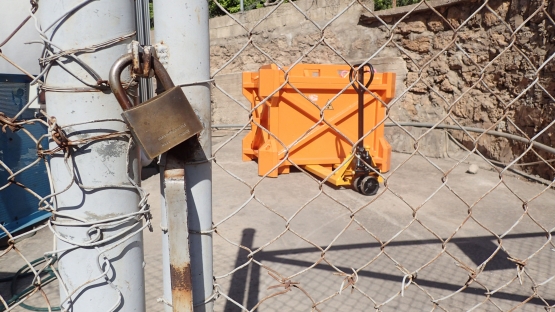As part of their efforts to increase nuclear safety and security in Lebanon, the country’s authorities repatriated a disused sealed radioactive source to France with IAEA support last month.
IAEA experts assisted in the removal of the Cobalt-60 teletherapy unit, which had been lying in a storage pit of a Beirut hospital for 20 years after its use in equipment to treat cancerous tumours.
The teletherapy unit has an approximate radioactivity of 40 curies, enough to cause permanent injury, according to Andrew Tompkins, Senior Nuclear Engineer at the IAEA and the expert leading the repatriation mission (See box).
The Lebanese Atomic Energy Commission, the regulatory authority responsible for the implementation of a radiation safety scheme in Lebanon, administered the removal and repatriation process.
“One of our mandates is to promote nuclear safety and security throughout the Lebanese territories,” said Muzna Assi, Technical Advisor at the Commission. “In this regard, we are cooperating with the IAEA to repatriate all high activity sources, and since 2009, we have successfully completed four repatriation missions.”
The removal was completed within the framework of the Integrated Nuclear Security Support Plan (INSSP), which the IAEA develops in consultation with Member States to consolidate their nuclear security needs into integrated plans for nuclear security improvements and assistance. The INSSP has enabled the IAEA, Lebanon and the donors financing the mission to plan and coordinate activities both technically and financially.
The IAEA worked with the Lebanese Atomic Energy Commission, the teletherapy unit’s production company and relevant stakeholders to establish the proper technical and legal frameworks to disassemble the unit, package it and repatriate it to its country of origin.
“The primary challenge in dealing with such sources is the adequacy of resources and planning,” Tompkins said. “When local resources are inadequate, the IAEA works to find donors who share the IAEA’s concerns for nuclear safety and security.”
The mission was part of an effort to remove several sources and was made possible with contributions from France, the European Union, the United States of America and the IAEA. The Lebanese Atomic Energy Commission said it will cooperate with the IAEA to remove the remaining sources from Lebanon within the coming two years.
The removal of high activity disused sealed radioactive sources and their repatriation to their countries of origin form part of IAEA’s activities to improve the security of such radioactive material by making it no longer accessible for malicious use.
With IAEA oversight, Lebanon has already repatriated 36 Cobalt-60 sources to Russia in 2009, a Cobalt-60 source to Germany in 2011 and another source to France in 2015.
The IAEA will be hosting the second International Conference on Nuclear Security in Vienna, Austria, from 5 to 9 December, 2016, which will include a ministerial segment and a scientific and technical programme on nuclear security. For participation and registration, visit the IAEA conference web page.




